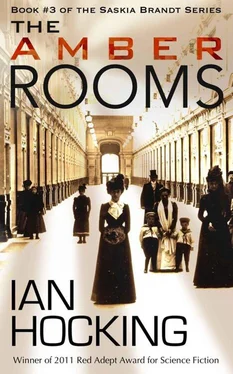In haste, A friend
This note she placed in an envelope addressed to General Aleksandr Gerasimov, Fontanka 16.
She drew a second piece of paper and wrote:
My dear, I am disconsolate. Don’t wait for me.
Yours, T
This she addressed to Max—Robespierre’s current cryptonym—at a hotel in the north-east of St Petersburg. She gave both envelopes to the boy when he came. Then she loosened the buttons on her blouse and lay on the bed. She wondered what it would feel like to die. Would it be like going home? Her memories of those parallel universes, and the two deaths there, were half-formed, as though they had happened to someone else. Would it be like rebirth, into nothing?
The stump of her wrist itched. She scratched it, thinking, Not yet .
She wondered if her Plan B was going to work. She felt like a fool; the jingling, irritating complement of a knight who highlights the virtues of the knight through contrast.
~
After sunset, the house on the Moika was glorious beneath floes of cloud, and dramatic with electric light and its rolling flags: the Imperial and Tsar Ivan’s double-headed eagle. Saskia stood across the street. She had adopted the costume of the Finnish doorway woman, rolled in some dust and old manure, and bought the stock of a nearby abacus seller. Now, as a downtrodden abacus seller herself, late in a hard life, she rested with her shoulder against a telegraph pole. The electric traffic within the pole fell upon her as a cascade of whispers.
She waited until midnight. Then she left her abacuses in a pile, set fire to it, and ambled across the road. She watched the flames grow from the anonymity of shadow next to Nakhimov residence. Passers-by stopped to look. A shopkeeper came down from his flat and struck at the blaze with his nightcap. Finally, a policeman approached and created a perimeter. These dozen people, including the duty footman of the Nakhimovs, waited for the arrival of a horse-drawn fire engine, whose bell could already be heard from the direction of the Admiralty.
The light reflected in the eyes of Saskia until she turned away, expressionless, and climbed the Nakhimov house using the drainpipe and the gaps between its stones. Because she was a dark shape against the light facade, she did not stop when she reached the Imperial flag. She made a risky grab for its base and swung her foot onto the small balcony behind it. She slipped onto the balcony and crouched, panting. Her heart rang like the bell of the fire engine.
She pushed her way inside. This was the library. Here, she had waited to meet the Countess and Pavel Eduardovitch those three months before, when she had hoped to journey home through the Amber Room. The piano, bought for the birth of Ludmilla, was still there. There was a reality in which the piano was indeed played by her; but not this one.
The library was lit by floor lamps near its three closed doorways. The books seemed to watch her. Saskia shook her head at this notion; it was the lens of her fear warping the room, nothing more.
I will lead my fear , she thought.
She waited for the clocks to strike the half hour. Then she hurried.
~
At midnight, when Pasha had been sleeping in his bed long enough, Saskia opened her eyes. She had been hanging upside down in a dark corner of his room for two hours, unnoticed. She turned her head until the cartilage in her neck loosened with a click. She unwrapped her legs from the chain of the chandelier and lowered herself into a vertical position. Her legs were numb but not lifeless and she dropped onto a bear rug and crouched until the burning of the blood passed.
‘Good evening, Ms Tucholsky,’ said Pasha. He was sitting upright in his bed. Trunks and suitcases had been stacked behind him. As ever, the monogram on the lapel of his pyjamas made a constellation in the darkness.
‘We’re beyond that,’ said Saskia. She did not move from her crouch. ‘You know me now as Saskia Brandt.’
‘I see you as well as you see me, my friend.’
‘Do you see me now?’
‘Yes.’ Pasha moved so that he was sitting cross-legged on his bed. He smiled. ‘Are you scared?’
Saskia rose. Her plimsolls were quiet on the floor, but the wood popped. Street sounds could be heard through the open window. She reached the end of the bed.
‘What do you see?’
‘A young woman in black clothes. Your eyes are black but your skin is white, patterned darkly.’
‘The pattern is my vasculature. You see not only past the darkness, Pasha, but deeper. You are now sensitive to wavelengths of light above and below that of other people.’
‘Wavelengths?’
‘The spatial period of a wave. The waves in this case are those of electromagnetic radiation. The wavelengths can be very short, or very long, and we plot all lengths on a dimension known as the electromagnetic spectrum. The majority of what you see at this moment is derived from the near-infra red, which you can think of as wavelengths slightly longer than what normal people label as red.’
Pasha looked at his hands. ‘I can see further into myself.’
‘Perhaps,’ said Saskia, carefully.
‘What else can I do? I am stronger, of course. Yesterday, I tried to lift my bureau. It was impossible at first, but then I felt a second strength combine with my own, and the bureau rose.’
‘Did your arms hurt afterwards?’
‘Yes. Tremendously. Is that the cost of this power?’
‘Cost,’ said Saskia, ‘is not the right word. Your muscles and skeleton, and all the connecting tissues, are designed for a given capacity of work. When you exceed that capacity, you hurt yourself. But the thing that gives you strength also gives you the capacity to recover more quickly.’
‘Can I die?’
Saskia looked at the black handkerchief around her amputation. ‘That,’ she said, ‘will be difficult.’
‘Yet this is not a gift?’
Saskia sat on the edge of the bed, put her elbow on her knee, and cupped her chin.
‘Pavel Eduardovitch, I could not leave you to die. I didn’t think about your future, or mine, or that of the thing I put inside your body. I’m sorry.’
‘This thing—is it a spell?’
‘At one level it is a spell. At another, it can be explained in the language of science. You can choose which.’
‘I choose science.’
Saskia raised an eyebrow and looked at him. He expected her to be proud of that statement, but she was not.
‘What about your faith?’
Pasha smiled. ‘“O Lord, revive me, for Your name’s sake. For Your righteousness, deliver my soul from danger.” Is it not so?’
There was a new strength to his voice. Saskia wanted to believe that it was not the i-Core, an alien addition, but a hint of the parallel Pavel Eduardovitch.
‘You are a strong person,’ she said. The lower lids of her eyes brimmed. ‘Stronger than me, I would say.’
‘When I dream,’ he said, ‘the spell talks to me through the mouths of dogs. What about you, Ms Brandt?’
‘Sparrows.’
Pasha nodded. Saskia felt his eyes on her for long seconds. He was deciding whether or not to ask a question.
‘Speak, Pavel Eduardovitch.’
‘Please, don’t be sad. You have given me life, and other things. I dreamed that the dogs formed a team and pulled my sled across miles of snow until I came to a place not unlike the Great Summer Palace but made entirely of ice. Inside, I found the Amber Room. Its walls were transparent and it had no ceiling. A woman was sitting there, at a piano, playing while the snow fell.’
‘Me?’
‘No, my sister Ludmilla.’
Saskia turned to him.
‘Go on.’
‘She played me a beautiful piece on the piano. She had … she had,’ Pasha swallowed and looked down. In a wavering voice, he said, ‘She had Mother’s eyes.’
Читать дальше












